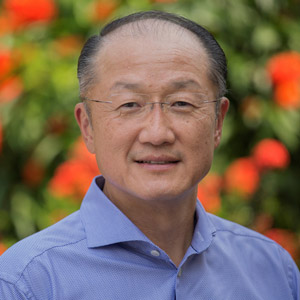Jim Yong Kim

Jim Yong Kim, M.D., PhD, is Vice Chairman and Partner at Global Infrastructure Partners, a fund that invests in infrastructure projects across several sectors around the world.
From July 2012 to February 2019, Kim served as the 12th President of the World Bank Group. Soon after he assumed that position, the organization established two goals to guide its work: to end extreme poverty by 2030; and to boost shared prosperity, focusing on the bottom 40 percent of the population in developing countries.
During Kim’s tenure, the World Bank Group supported the development priorities of countries at levels never seen outside of a financial crisis. Along with partners, the World Bank achieved two successive, record replenishments of the International Development Association (IDA), the institution’s fund for the poorest countries, which has enabled the Bank to greatly increase its work in areas suffering from fragility, conflict, and violence.
In 2018, the World Bank Group’s shareholders approved a historic capital increase for the International Bank for Reconstruction and Development (IBRD), which offers sovereign loans to middle-income countries, and the International Finance Corporation (IFC), the Bank Group’s private sector arm. The capital increase will allow the Bank Group to help countries reach their development goals while responding to crises such as climate change, pandemics, fragility, and underinvestment in human capital around the world.
The World Bank Group also launched several innovative financial instruments, including facilities to address infrastructure needs, prevent pandemics, and help the millions of people forcibly displaced from their homes by climate shocks, conflict, and violence. The Pandemic Emergency Financing Facility (PEF) made its first cash grant in 2018 to support frontline Ebola response efforts in the Democratic Republic of the Congo. As of January 2019, the Bank Group is working with the United Nations and leading technology companies to implement the Famine Action Mechanism, which uses technology such as artificial intelligence to detect warning signs earlier and prevent famines before they begin.
A physician and anthropologist, Kim’s career has revolved around health, education, and improving the lives of the poorest and most vulnerable. He was born in South Korea to parents who had fled the violence of the Korean War and grew up in Iowa, where his father was a practicing dentist and his mother was a philosopher and theologian. Kim graduated from Brown University, then became one of the first students to study jointly for a medical degree from Harvard Medical School and a PhD in anthropology at Harvard University.
While at Harvard, Kim co-founded Partners In Health, a non-profit medical organization that provides healthcare to poor communities on four continents. With Partners In Health, Kim developed treatment programs for complex, deadly diseases such as multi-drug-resistant tuberculosis and AIDS in the poorest areas of Haiti, Peru, and several other countries. From 2003 to 2005, Kim served as Director of the World Health Organization’s HIV/AIDS department. He led WHO’s “3 by 5” initiative, the first-ever global goal for AIDS treatment, which greatly expanded access to antiretroviral medication in developing countries.
Following his service at WHO, Kim was Chair of the Department of Global Health and Social Medicine at Harvard Medical School, Chief of the Division of Global Health Equity at Brigham and Women’s Hospital, and Director of the François-Xavier Bagnoud Center for Health and Human Rights at Harvard School of Public Health. In 2009, he was named the 17th President of Dartmouth College, where he served until he was nominated by President Barack Obama to lead the World Bank Group. Kim was the first leader of the Bank Group who did not come from the financial or political sectors and the first who had personal experience tackling development issues in poor countries.
Kim holds a B.A. from Brown University, and an M.D. and PhD in medical anthropology from Harvard University. He received a MacArthur “Genius” Fellowship, was recognized as one of America’s “25 Best Leaders” by U.S. News & World Report, and was named one of TIME magazine’s “100 Most Influential People in the World.”